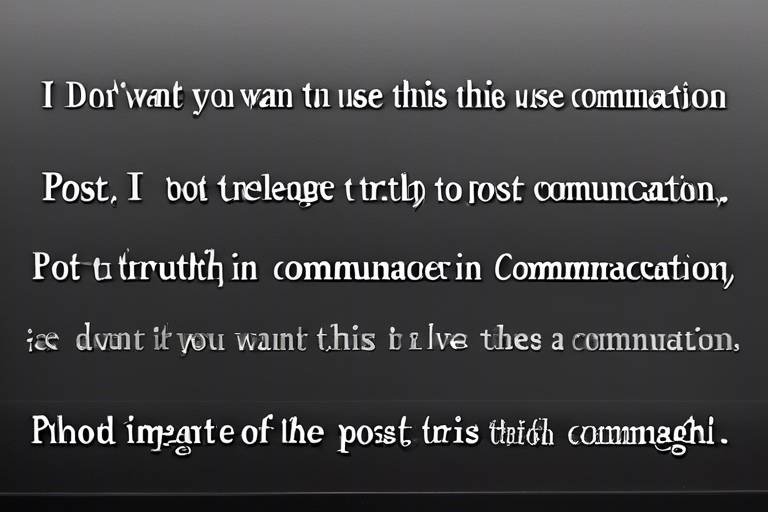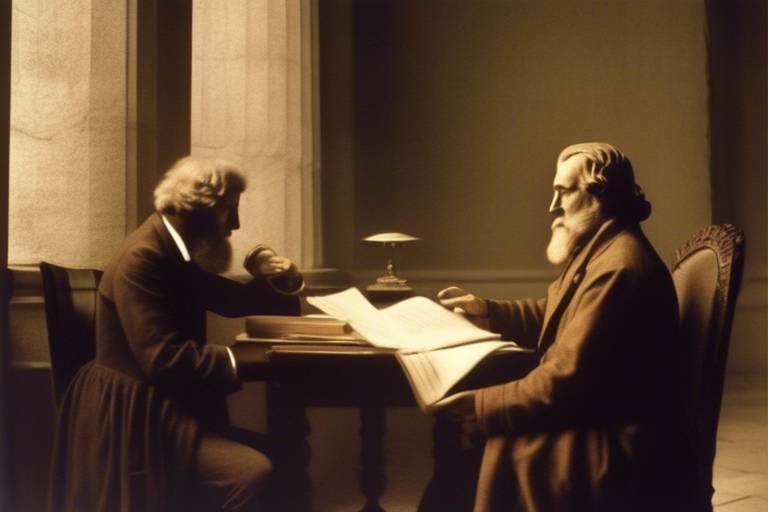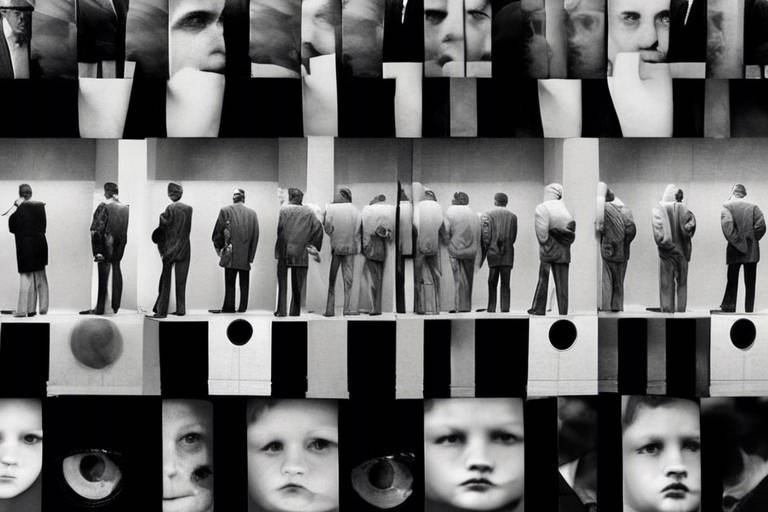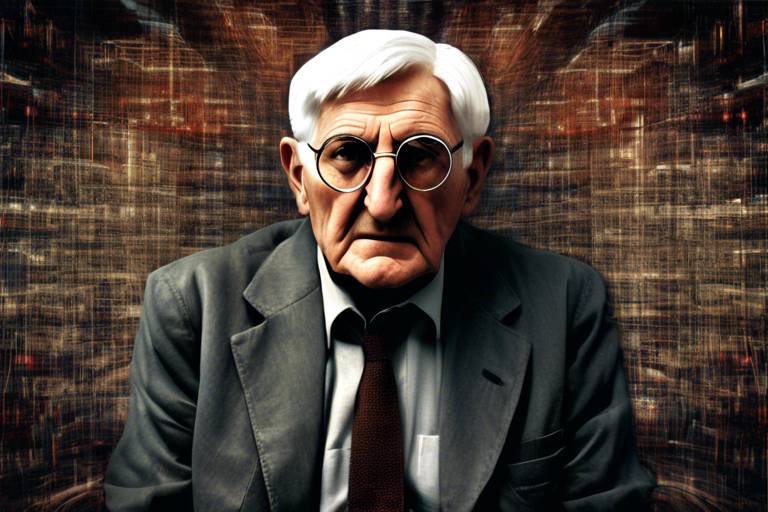Understanding Transcendental Idealism Through Kant's Eyes
Transcendental idealism is a fascinating philosophical theory that emerged from the mind of Immanuel Kant, one of the most influential thinkers in Western philosophy. At its core, this theory suggests that our experience of reality is not merely a straightforward reflection of the external world. Instead, it is intricately shaped by our perceptions and the cognitive structures we possess. Imagine looking at a beautiful painting; the colors, shapes, and emotions you perceive are not just on the canvas but also in how your mind interprets them. This is the essence of transcendental idealism—it posits that our understanding of the world is filtered through our mental frameworks, making the act of perception an active process rather than a passive one.
Kant's revolutionary ideas challenge the traditional notions of knowledge that had dominated philosophical discourse prior to his time. By emphasizing the role of the mind in interpreting sensory experiences, Kant invites us to reconsider the very nature of reality. This perspective raises important questions: If our understanding of the world is constructed by our minds, then what does that say about the existence of an objective reality? Are we merely prisoners of our perceptions, unable to grasp the true essence of the world around us? These questions form the foundation of Kant's exploration into the realms of epistemology and metaphysics, making his work a cornerstone for anyone interested in the intricacies of human thought and understanding.
To navigate through Kant's ideas, it is essential to grasp some key concepts that underpin transcendental idealism. Kant distinguishes between a priori and a posteriori knowledge. A priori knowledge refers to concepts that are inherent to human cognition, such as space and time. These are not learned through experience but are rather the lenses through which we perceive all phenomena. Think of them as the frames of a camera; without them, the picture would be entirely different. This leads us to the idea that space and time are not just external realities but forms of intuition that help us organize our experiences meaningfully.
Furthermore, Kant introduces the categories of understanding, which are fundamental concepts that structure our thought processes. These categories allow us to make sense of our experiences and the world around us. They act as the building blocks of our understanding, shaping how we interpret everything from simple objects to complex ideas. By recognizing these categories, we can appreciate how our minds play an active role in constructing our perception of reality.
A crucial aspect of Kant's philosophy is the distinction he makes between phenomena and noumena. Phenomena refer to the world as we experience it—our perceptions and interpretations of reality—while noumena represent the world as it exists independently of our perceptions. This distinction raises profound questions about the limits of human knowledge. Can we ever truly know the noumenal world, or are we forever confined to our subjective experiences? This inquiry not only challenges our understanding of reality but also invites us to explore the depths of human cognition and perception.
As we delve deeper into Kant's transcendental idealism, we begin to see its profound impact on modern philosophy. Kant's ideas have shaped contemporary debates in epistemology, metaphysics, and ethics, prompting further exploration of the relationship between perception and reality. His work has inspired countless philosophers to engage in discussions about knowledge, existence, and the nature of reality, making him a pivotal figure in the landscape of philosophical thought.
In conclusion, understanding transcendental idealism through Kant's eyes opens up a world of inquiry into how we perceive reality. It challenges us to think critically about the relationship between our minds and the external world, encouraging a deeper appreciation for the complexity of human cognition. As we continue to explore these ideas, we may find that the questions Kant posed are as relevant today as they were in his time, inviting us to reflect on the very nature of existence itself.
- What is the main idea of transcendental idealism?
Transcendental idealism posits that our experience of reality is shaped by our perceptions and cognitive structures, rather than being a direct reflection of the external world.
- How did Kant contribute to philosophy?
Kant challenged traditional notions of knowledge and emphasized the role of the mind in interpreting sensory experiences, laying the groundwork for modern epistemology and metaphysics.
- What is the difference between phenomena and noumena?
Phenomena are the world as we experience it, while noumena are the world as it exists independently of our perceptions.
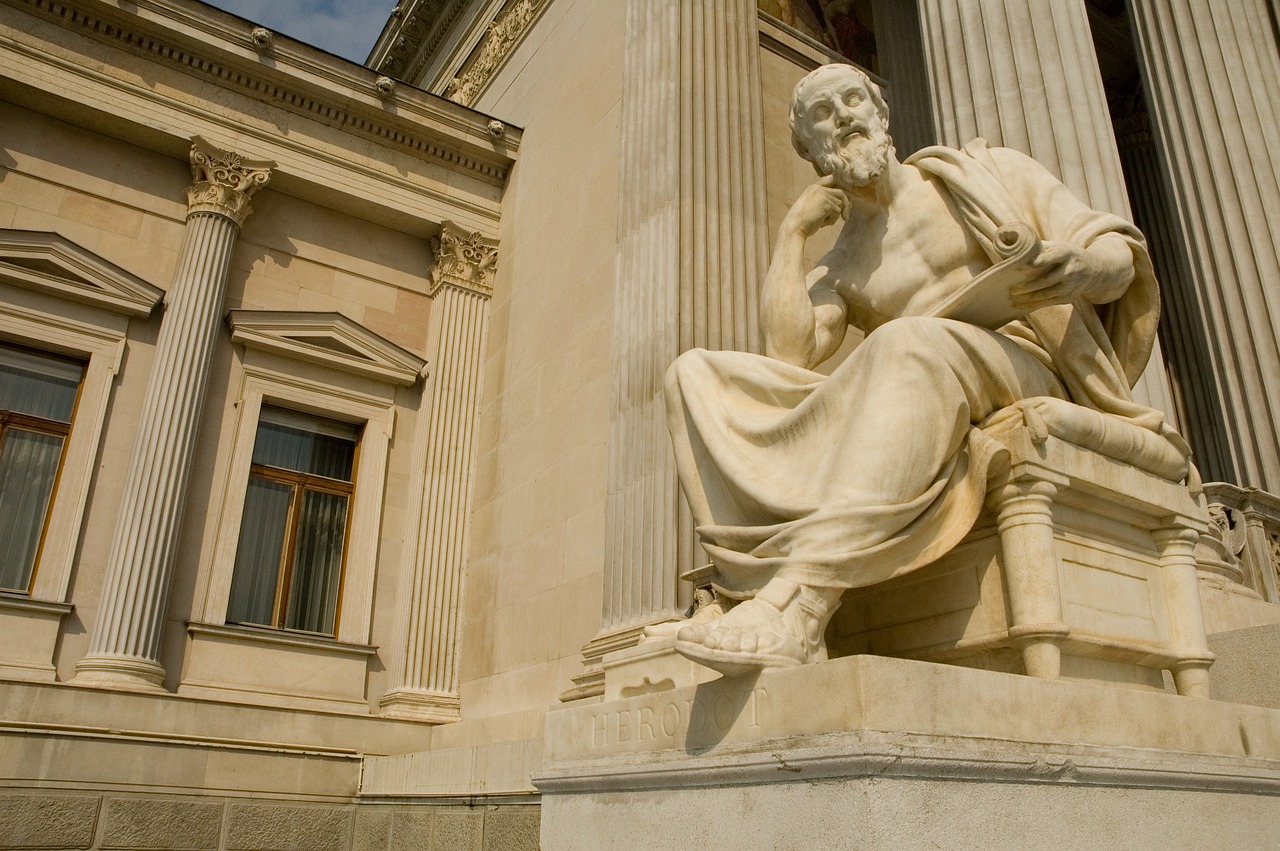
What is Transcendental Idealism?
Transcendental idealism is a profound philosophical theory introduced by Immanuel Kant, which fundamentally reshapes our understanding of reality. At its core, this theory asserts that our experience of the world is not merely a direct reflection of external objects but is instead shaped by our perceptions and the cognitive structures inherent to human beings. In simpler terms, Kant argues that what we perceive is not the world itself, but rather a world filtered through our minds.
To grasp this concept, imagine wearing a pair of colored glasses. The colors you see are not the actual colors of the objects around you; they are a result of the lenses through which you view them. Similarly, Kant posits that our understanding of reality is colored by our mental frameworks, which include innate concepts and categories that help us interpret sensory information. This idea challenges the traditional notion that knowledge is simply derived from the external world, emphasizing instead that the mind plays a crucial role in shaping our experiences.
In transcendental idealism, Kant makes a significant distinction between phenomena and noumena. Phenomena refer to the world as we experience it—our perceptions, feelings, and thoughts about reality. In contrast, noumena represent the world as it exists independently of our perceptions. This distinction raises intriguing questions about the limits of human knowledge: can we ever truly know the noumenal world, or are we forever confined to our subjective experiences?
Ultimately, transcendental idealism invites us to reconsider the relationship between the mind and the world. It suggests that while we can gain insights about reality through our experiences, those insights are always mediated by our cognitive structures. This perspective has significant implications not only for philosophy but also for fields like psychology and cognitive science, as it encourages a deeper exploration of how we construct knowledge and meaning in our lives.

Kant's Critique of Pure Reason
In his seminal work, Critique of Pure Reason, Immanuel Kant embarks on a philosophical journey that reshapes our understanding of knowledge itself. This text serves as a cornerstone for transcendental idealism, where Kant challenges the traditional views that knowledge is merely a passive reflection of the external world. Instead, he posits that our cognition actively shapes our experience of reality. This groundbreaking perspective invites readers to reconsider the very nature of perception and understanding.
Kant's exploration begins with a critical examination of how we acquire knowledge. He introduces the idea that our experiences are not just random occurrences but are structured by innate cognitive faculties. To illustrate this, Kant distinguishes between two types of knowledge: a priori and a posteriori. A priori knowledge is independent of experience, such as mathematical truths, while a posteriori knowledge is derived from sensory experience, like the color of a flower. This distinction is crucial because it highlights that some concepts are inherent to our understanding and do not rely on external validation.
One of the most fascinating aspects of Kant's argument is his assertion that space and time are not merely external realities but the very frameworks through which we perceive phenomena. He refers to these as forms of intuition. Imagine trying to understand a painting without a canvas; similarly, Kant argues that our experiences are 'painted' onto the canvas of space and time. This analogy emphasizes that without these forms, our sensory experiences would be chaotic and unintelligible.
To further elucidate his point, Kant introduces the categories of understanding. These categories are fundamental concepts that structure human thought, allowing us to categorize and interpret our experiences. They include notions like causality, unity, and plurality. Without these categories, our experiences would be mere disjointed sensations, lacking coherence and meaning. Kant's systematic approach to understanding how these categories function in our cognition is a significant contribution to epistemology.
However, Kant does not stop at merely explaining how we perceive the world. He also raises profound questions about the limits of human knowledge. By delineating the distinction between phenomena (the world as we experience it) and noumena (the world as it exists independently of our perceptions), he highlights a critical philosophical boundary. This distinction leads us to ponder: can we ever truly know the noumenal world? Or are we forever confined to our subjective experiences? This question remains a pivotal point of discussion in modern philosophy.
In summary, Kant's Critique of Pure Reason serves as a foundational text that not only critiques prior epistemological theories but also lays the groundwork for a new understanding of knowledge. By emphasizing the active role of the mind in shaping our experiences, Kant invites us to explore the intricate relationship between perception and reality. His insights continue to resonate, prompting ongoing debates about the nature of knowledge and existence.
- What is the main argument of Kant's Critique of Pure Reason?
Kant argues that our understanding of reality is shaped by our cognitive structures, rather than being a direct reflection of the external world. - What is the difference between a priori and a posteriori knowledge?
A priori knowledge is independent of experience, while a posteriori knowledge is derived from sensory experiences. - What are phenomena and noumena?
Phemomena refer to the world as we experience it, while noumena refer to the world as it exists independently of our perceptions.

Critique of Pure Reason,
This article explores the core concepts of transcendental idealism as presented by Immanuel Kant, delving into its implications for epistemology, metaphysics, and the nature of reality.
Transcendental idealism is a philosophical theory posited by Kant, asserting that our experience of reality is shaped by our perceptions and cognitive structures, rather than being a direct reflection of the external world.
In his seminal work, Critique of Pure Reason, Kant lays the groundwork for transcendental idealism, challenging traditional notions of knowledge and emphasizing the role of the mind in interpreting sensory experiences. This work is akin to a philosophical earthquake, shaking the very foundations of how we understand knowledge and existence. Kant's approach is revolutionary; he argues that our understanding of the world is not merely a passive reception of information but an active process where our minds play a crucial role. This shift in perspective invites us to reconsider the reliability of our perceptions and the nature of reality itself.
Kant distinguishes between a priori and a posteriori knowledge, arguing that certain concepts, like space and time, are inherent to human cognition and shape our understanding of the world. A priori knowledge refers to knowledge that is independent of experience, such as mathematical truths, while a posteriori knowledge is derived from sensory experiences. Kant asserts that our ability to comprehend the world is fundamentally rooted in these a priori concepts that frame our experiences.
Kant posits that space and time are not external realities but rather the forms through which we perceive phenomena, allowing us to organize experiences meaningfully. Imagine trying to make sense of a jigsaw puzzle without knowing the shape of the pieces or the picture they form. Space and time serve as the essential framework that enables us to arrange our experiences coherently. Without these forms of intuition, our perceptions would be chaotic and incomprehensible.
The categories of understanding are fundamental concepts that structure human thought, enabling us to make sense of our experiences and the world around us. Kant identifies several categories, including causality, unity, and plurality. These categories act like a lens through which we interpret the myriad of sensations we encounter. They help us to categorize and relate our experiences, transforming raw sensory data into coherent knowledge.
Kant introduces the distinction between phenomena (the world as we experience it) and noumena (the world as it exists independently of our perceptions), raising questions about the limits of human knowledge. This distinction is crucial; while we can only know phenomena—what we perceive through our senses—the noumena remain fundamentally inaccessible to us. This leads to profound implications about the nature of reality and our understanding of it. Are we merely experiencing shadows of the true world, or is our perception itself a reality?
Kant's transcendental idealism has profoundly influenced contemporary philosophical discourse, shaping debates in epistemology, metaphysics, and ethics, and prompting further exploration of the relationship between perception and reality. His ideas have become a cornerstone for many philosophical movements that followed, urging thinkers to grapple with the implications of his theories.
Empiricist philosophers, such as Hume, challenged Kant's ideas, emphasizing the importance of sensory experience as the foundation of knowledge, leading to significant philosophical debates. They argued that knowledge must stem from observable phenomena rather than inherent cognitive structures, creating a rich dialogue that continues to this day.
Kant's ideas laid the groundwork for later movements like phenomenology, which further examined the structures of consciousness and the nature of experience, continuing the exploration of idealism in philosophy. Phenomenologists took Kant's insights and pushed them further, investigating how consciousness shapes our reality.
- What is the main idea of Kant's Critique of Pure Reason?
The main idea is that our understanding of reality is not a direct reflection of the external world but is shaped by our cognitive structures and perceptions.
- How does Kant differentiate between phenomena and noumena?
Kant distinguishes phenomena as the world as we perceive it, while noumena refer to the world as it exists independently of our perceptions, which we cannot know directly.
- What is the significance of a priori knowledge in Kant's philosophy?
A priori knowledge is significant because it represents concepts that shape our understanding of experiences, such as space and time, which are essential for organizing our perceptions.

Kant lays the groundwork for transcendental idealism, challenging traditional notions of knowledge and emphasizing the role of the mind in interpreting sensory experiences.
This article explores the core concepts of transcendental idealism as presented by Immanuel Kant, delving into its implications for epistemology, metaphysics, and the nature of reality.
Transcendental idealism is a philosophical theory posited by Kant, asserting that our experience of reality is shaped by our perceptions and cognitive structures, rather than being a direct reflection of the external world.
In his seminal work, Critique of Pure Reason, Kant lays the groundwork for transcendental idealism, challenging traditional notions of knowledge and emphasizing the role of the mind in interpreting sensory experiences.
Kant distinguishes between a priori and a posteriori knowledge, arguing that certain concepts, like space and time, are inherent to human cognition and shape our understanding of the world.
Kant posits that space and time are not external realities but rather the forms through which we perceive phenomena, allowing us to organize experiences meaningfully.
The categories of understanding are fundamental concepts that structure human thought, enabling us to make sense of our experiences and the world around us.
Kant introduces the distinction between phenomena (the world as we experience it) and noumena (the world as it exists independently of our perceptions), raising questions about the limits of human knowledge.
Kant's transcendental idealism has profoundly influenced contemporary philosophical discourse, shaping debates in epistemology, metaphysics, and ethics, and prompting further exploration of the relationship between perception and reality.
Empiricist philosophers, such as Hume, challenged Kant's ideas, emphasizing the importance of sensory experience as the foundation of knowledge, leading to significant philosophical debates.
Kant's ideas laid the groundwork for later movements like phenomenology, which further examined the structures of consciousness and the nature of experience, continuing the exploration of idealism in philosophy.
Kant lays the groundwork for transcendental idealism, challenging traditional notions of knowledge and emphasizing the role of the mind in interpreting sensory experiences. His approach was revolutionary, as he suggested that our understanding of reality is not merely a passive reception of external stimuli. Instead, he argued that the mind actively shapes our experiences. This perspective shifts the focus from the objects of knowledge to the processes by which we come to know them.
To illustrate this point, consider how two people can witness the same event but interpret it differently based on their prior experiences and mental frameworks. Kant believed that these frameworks are not arbitrary but are instead structured by innate categories of understanding, such as causality and substance. This means that knowledge is not just about collecting data from the world but involves the mind's active role in organizing and interpreting that data.
Furthermore, Kant's exploration of a priori knowledge, or knowledge that is independent of experience, plays a crucial role in his theory. He posited that certain fundamental concepts, like space and time, are built into our cognition and are essential for making sense of our experiences. This idea challenges the traditional empiricist view that all knowledge comes from sensory experience, suggesting instead that our minds come equipped with certain tools that shape how we perceive reality.
In this way, Kant's work invites us to reconsider the nature of knowledge itself. It leads us to ask questions such as:
- What role does the mind play in shaping our perception of reality?
- Are there universal concepts that guide our understanding, regardless of individual experiences?
- How do we reconcile subjective interpretations with a shared understanding of the world?
Ultimately, Kant's transcendental idealism lays a profound foundation for modern philosophy, urging us to recognize the active role our minds play in constructing our understanding of the world around us.
- What is transcendental idealism?
Transcendental idealism is a philosophical theory proposed by Immanuel Kant, which asserts that our understanding of reality is shaped by our perceptions and cognitive structures.
- How does Kant differentiate between a priori and a posteriori knowledge?
Kant distinguishes a priori knowledge as that which is independent of experience, while a posteriori knowledge is based on sensory experience.
- What are phenomena and noumena?
Phenomena refer to the world as we experience it, while noumena represent the world as it exists independently of our perceptions.
- Why is Kant's work significant in modern philosophy?
Kant's ideas have influenced contemporary debates in epistemology, metaphysics, and ethics, prompting further exploration of the relationship between perception and reality.

The Role of A Priori Knowledge
When we dive into the depths of Kant's philosophy, one of the most intriguing concepts that emerges is that of a priori knowledge. This term might sound a bit intimidating at first, but let's break it down. A priori knowledge refers to the understanding we possess independent of experience. Imagine it as the blueprint of our cognitive architecture—it's like having a map before embarking on a journey. Kant argues that certain ideas, such as space and time, are not just learned through our interactions with the world; rather, they are fundamental structures of our mind that shape how we perceive everything around us.
To illustrate this further, think of a painter who has a canvas and a set of colors. The canvas represents our mind, and the colors signify the a priori concepts. Just as the painter can't create a masterpiece without a canvas, we cannot comprehend our experiences without the a priori knowledge that organizes them. Kant emphasizes that these concepts are not derived from the external world but are innate to human cognition. They act as the lens through which we interpret sensory data, allowing us to make sense of the chaos around us.
Kant contrasts a priori knowledge with a posteriori knowledge, which is knowledge gained through experience. To put it simply, a posteriori knowledge is like learning to ride a bike; you need to get on the bike and practice to understand how it works. In contrast, a priori knowledge is akin to knowing that a bike has two wheels and handlebars before you ever get on one. This distinction is crucial because it highlights that while our experiences inform us, they are filtered through these inherent cognitive structures.
In a way, a priori knowledge serves as the foundation upon which we build our understanding of the world. It’s not just about knowing facts; it’s about having the framework that allows us to interpret those facts. Without this framework, our experiences would be mere chaos, lacking coherence and meaning. Kant's exploration of this concept prompts us to consider: How much of what we know is a product of our innate structures versus our experiences?
In summary, a priori knowledge is pivotal in Kant's philosophy. It shapes our perception and understanding of reality, providing the necessary structure to make sense of our experiences. By recognizing the role of a priori knowledge, we gain insight into how our minds work and how we interact with the world around us. This understanding not only enriches our grasp of Kant's ideas but also opens the door to further philosophical inquiry about the nature of knowledge itself.

Space and Time as Forms of Intuition
When we think about space and time, it's easy to assume they are just the backdrop of our lives, the stage upon which our experiences unfold. However, Kant turns this notion on its head by asserting that space and time are not merely external realities waiting to be discovered; instead, they are the very frameworks through which we perceive and organize our experiences. In this sense, they serve as forms of intuition that shape our understanding of the world. Imagine trying to watch a movie without a screen—without a way to project the images, the story would remain untold. Similarly, space and time are the screens of our perception, allowing us to make sense of the chaos around us.
Kant argues that these forms of intuition are innate to human cognition. They are not learned or derived from experience; rather, they are preconditions for any experience to take place. This means that every sensory experience we have is filtered through the lenses of space and time. For instance, when we perceive an object, we inherently understand it as being located in a specific space and occurring at a particular time. This is crucial because it implies that our understanding of reality is fundamentally shaped by these intuitions, making them essential to our knowledge.
To illustrate this concept further, consider the following points:
- Space: Kant posits that space is not an external entity but a way our mind structures our experiences. It allows us to distinguish between objects and their relationships to one another.
- Time: Time, according to Kant, is the medium in which we perceive change and succession. It helps us understand events as they unfold, allowing us to make sense of our experiences chronologically.
This leads us to ponder: if space and time are merely forms of intuition, what does that say about the nature of reality itself? Are we, then, prisoners of our own perceptions, unable to grasp the true essence of things as they exist independently of us? Kant's exploration of space and time as forms of intuition invites us to reflect on the limitations of our understanding and the profound implications this has for our grasp of reality. It challenges us to consider the possibility that what we perceive may not be the ultimate truth but rather a construct shaped by the very faculties of our mind.
In summary, Kant’s perspective on space and time as forms of intuition is revolutionary. It shifts the focus from an objective reality to a subjective experience, emphasizing the role of human cognition in shaping what we know. This nuanced understanding not only enriches our grasp of epistemology but also opens up new avenues for philosophical inquiry, inviting us to question the very nature of existence and our place within it.
1. What does Kant mean by "forms of intuition"?
Kant refers to space and time as "forms of intuition" because they are the fundamental ways through which we perceive and understand our experiences. They are not external realities but rather innate structures within our minds that shape our perception.
2. Are space and time the same for everyone?
While Kant argues that space and time are universal forms of intuition inherent to human cognition, the way individuals perceive and experience them may vary based on context, culture, and personal experiences.
3. How does Kant's view of space and time differ from traditional views?
Traditional views often treat space and time as external, objective realities. In contrast, Kant argues that they are subjective frameworks that shape our understanding of reality, highlighting the role of human perception in interpreting experiences.
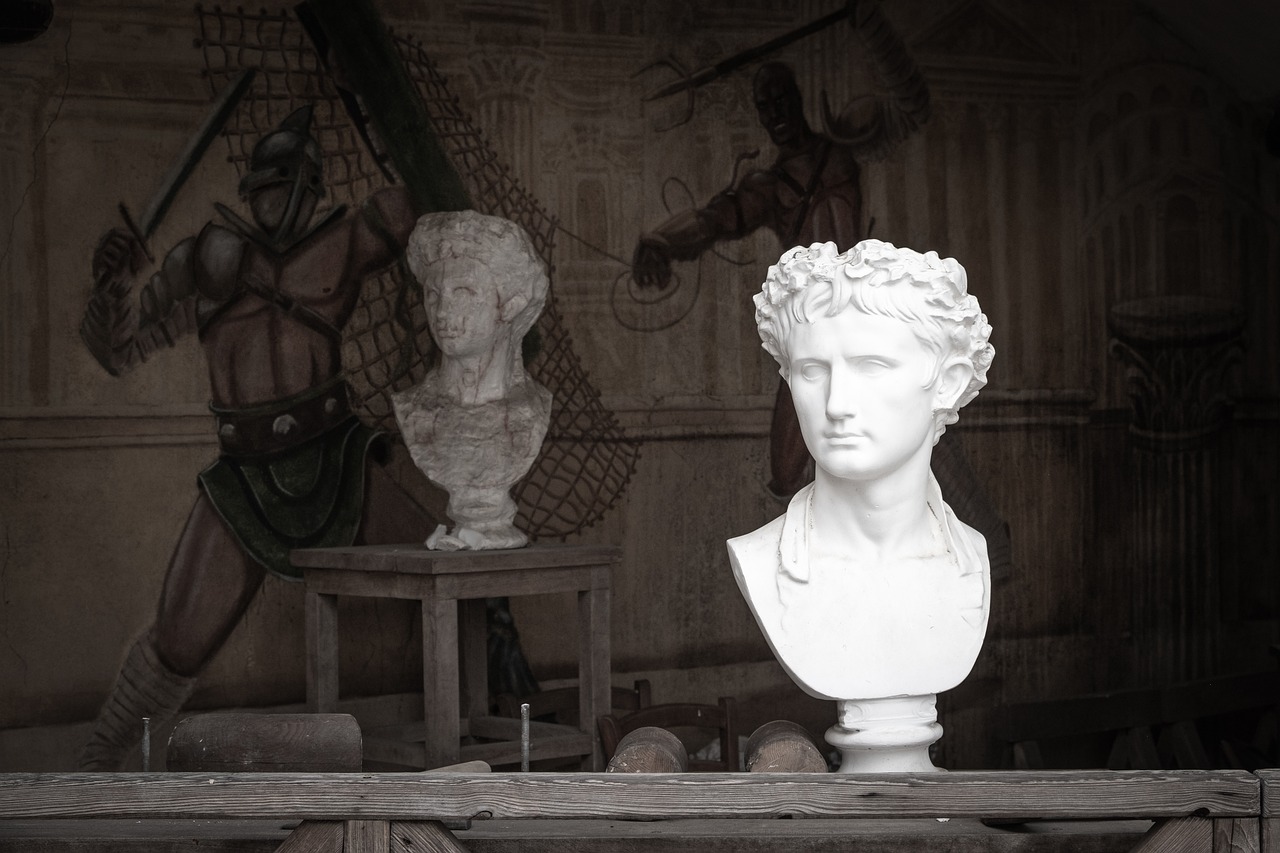
Categories of Understanding
The are central to Immanuel Kant's philosophy, serving as the essential building blocks of human cognition. According to Kant, these categories are innate concepts that shape our experiences and perceptions of the world. Rather than being passive recipients of sensory information, our minds actively organize and interpret these inputs through these fundamental categories. This idea challenges the traditional view that knowledge is merely a reflection of the external world.
Kant identifies several key categories, which can be grouped into four primary classes: quantity, quality, relation, and modality. Each category serves a specific function in how we comprehend our experiences:
| Category | Description |
|---|---|
| Quantity | Refers to the concepts of unity, plurality, and totality, helping us understand the numerical aspects of our experiences. |
| Quality | Involves the notions of reality, negation, and limitation, allowing us to differentiate between what is and what is not. |
| Relation | Concerns the connections between objects and events, including causality, which is crucial for understanding the dynamics of our experiences. |
| Modality | Addresses the necessity, possibility, and existence of phenomena, shaping our understanding of how things can be. |
These categories are not just abstract concepts; they are vital for making sense of our everyday experiences. Imagine trying to navigate a bustling city without the ability to categorize your experiences. You'd struggle to understand the relationships between different buildings, the flow of traffic, or even the essence of time as you move through the streets. In this way, the categories of understanding act as a cognitive framework, enabling us to make sense of the chaos around us.
Moreover, Kant argues that these categories are a priori, meaning they exist in our minds prior to any sensory experience. This is a crucial point because it suggests that our understanding of the world is not solely derived from what we observe but is also influenced by the inherent structures of our cognition. This interplay between experience and innate categories raises profound questions about the nature of knowledge itself. Can we ever truly know the world as it is, or are we forever bound by the limits of our understanding?
In conclusion, the categories of understanding play a pivotal role in Kant's epistemology. They are the lenses through which we view and interpret our experiences, shaping our reality in ways that are both profound and complex. By recognizing the importance of these categories, we begin to appreciate the intricate relationship between perception and understanding, a theme that resonates throughout Kant's work and continues to influence philosophical thought today.
- What are the categories of understanding? They are innate concepts that help shape our perceptions and experiences, allowing us to make sense of the world.
- How many categories did Kant identify? Kant identified four primary categories: quantity, quality, relation, and modality.
- Are these categories learned or innate? Kant argued that these categories are a priori, meaning they exist in our minds prior to any sensory experience.
- What is the significance of these categories in Kant's philosophy? They serve as the cognitive framework through which we interpret our experiences, raising questions about the nature of knowledge and reality.

Phenomena vs. Noumena
In the realm of Kant's transcendental idealism, the distinction between phenomena and noumena plays a pivotal role in understanding how we perceive and interpret reality. To put it simply, phenomena refer to the world as we experience it through our senses, while noumena represent the world as it exists independently of our perceptions. It's like trying to take a photograph of a landscape; the image you capture is the phenomenon, but the actual landscape, with all its complexities and details, exists beyond your camera's lens—this is the noumenon.
Kant argues that our access to the world is fundamentally limited. We can never truly know noumena because our understanding is always mediated by our senses and cognitive structures. This leads to a fascinating implication: while we can describe and analyze phenomena in great detail, the noumenal world remains an enigma. Imagine standing on the edge of a vast ocean; you can see the waves, feel the breeze, and hear the crashing surf. However, the depths of the ocean, its mysteries, and the life forms that exist beneath the surface are akin to noumena—present but ultimately unknowable.
To illustrate this distinction further, consider the following table:
| Aspect | Phenomena | Noumena |
|---|---|---|
| Definition | The world as experienced through senses | The world as it exists independently of perception |
| Accessibility | Accessible and knowable | Inaccessible and unknowable |
| Examples | Colors, sounds, and textures | The essence of objects, reality beyond perception |
This distinction raises profound questions about the limits of human knowledge. Can we ever truly understand the essence of things? Are our perceptions merely shadows of a deeper reality? Kant's exploration of these concepts challenges us to reflect on our own cognitive limitations and the nature of our experiences. It beckons us to consider the possibility that what we perceive is just the tip of the iceberg, with the vast, unseen world of noumena lurking beneath the surface, waiting to be contemplated.
Ultimately, the phenomena-noumena distinction invites us to engage in a deeper philosophical inquiry. It encourages us to question the validity of our beliefs and the nature of our understanding. In a world where perception is reality for many, Kant reminds us that there is always more than meets the eye—an intricate dance between what we see and what lies beyond our grasp.
- What is the main difference between phenomena and noumena?
Phenomena are the objects of our experience, while noumena are the things-in-themselves that exist independently of our perception. - Why can’t we know noumena?
According to Kant, our knowledge is limited to our sensory experiences, which means we can never truly access noumena. - How does this distinction impact our understanding of reality?
It suggests that our grasp of reality is inherently limited and that there may be aspects of existence that remain forever beyond our comprehension.

The Impact on Modern Philosophy
Kant's transcendental idealism has left an indelible mark on the landscape of modern philosophy, acting as a catalyst for numerous debates and discussions that continue to resonate today. His ideas challenge us to rethink the nature of knowledge, perception, and reality itself. By positing that our experiences are shaped by the cognitive structures of our minds, Kant invites us to consider how much of what we perceive is influenced by our internal frameworks rather than being a mere reflection of the external world. This radical shift in perspective has sparked a plethora of philosophical inquiries, leading scholars to explore the intricate relationship between the observer and the observed.
One of the most significant areas influenced by Kant's work is epistemology, the study of knowledge. Traditional views that prioritize sensory experience as the sole source of knowledge were challenged by Kant's assertion that our understanding is also shaped by innate categories of thought. This has led to a rich tapestry of discussions where philosophers grapple with questions such as: "Are there limits to what we can know?" and "How do our perceptions alter our understanding of reality?"
In addition to epistemology, Kant's ideas have profoundly impacted metaphysics, the branch of philosophy concerned with the nature of reality. His distinction between phenomena and noumena invites us to ponder the complexities of existence. While we can only know the world through our perceptions (phenomena), Kant suggests that there is a reality beyond our grasp (noumena) that exists independently. This duality has fueled debates among philosophers about the essence of reality and the extent to which we can ever truly understand it.
Moreover, Kant's transcendental idealism has implications for ethics, prompting discussions about moral responsibility and the nature of freedom. If our understanding of the world is mediated by our perceptions, then how do we account for moral judgments? Are they merely subjective interpretations, or do they reflect a deeper, objective reality? These questions have led to a reevaluation of ethical theories, influencing thinkers from various philosophical traditions.
To illustrate the impact of Kant's transcendental idealism, consider the following table that summarizes key philosophical movements influenced by his ideas:
| Philosophical Movement | Key Themes | Influence of Kant |
|---|---|---|
| Empiricism | Knowledge through sensory experience | Challenges Kant's ideas, emphasizing perception |
| Phenomenology | Structures of consciousness and experience | Builds on Kant's ideas of perception and reality |
| Existentialism | Individual experience and meaning | Kant's influence on subjectivity and freedom |
As we navigate through the complexities of modern philosophy, it's clear that Kant's transcendental idealism remains a pivotal point of reference. It has not only reshaped our understanding of knowledge and reality but has also laid the groundwork for ongoing exploration in various philosophical domains. The questions raised by Kant continue to inspire and challenge thinkers, ensuring that his legacy endures in contemporary discussions.
- What is transcendental idealism?
Transcendental idealism is a philosophical theory proposed by Immanuel Kant, suggesting that our understanding of reality is shaped by our perceptions and cognitive structures, rather than being a direct reflection of the external world. - How did Kant's ideas influence modern philosophy?
Kant's ideas have significantly impacted epistemology, metaphysics, and ethics, prompting debates about the nature of knowledge, reality, and moral responsibility. - What is the difference between phenomena and noumena?
Phenomena refer to the world as we experience it, while noumena represent the reality that exists independently of our perceptions.

Responses from Empiricists
When Immanuel Kant introduced his theory of transcendental idealism, it didn't go unnoticed by the empiricists of his time. These philosophers, who emphasized the role of sensory experience as the foundation of knowledge, had some compelling responses to Kant's assertions. They argued that knowledge stems primarily from what we can see, hear, touch, taste, and smell. In their view, the mind is like a blank slate at birth, and experience is the ink that fills it. This perspective leads to a fascinating debate about the nature of reality and how we come to understand it.
One of the most notable empiricists was David Hume, who raised significant challenges to Kant's ideas. Hume posited that our understanding of the world arises from our sensory experiences, and he was skeptical about the existence of innate concepts. For Hume, notions like causality and the self are not inherent but rather constructed through repeated experiences. This perspective leads to the conclusion that our knowledge is inherently limited by our sensory perceptions. After all, if we can only know what we can experience, then what does that say about the noumena—the things-in-themselves that Kant speaks of?
To illustrate this point, consider a simple analogy: imagine you are trying to understand a painting while blindfolded. You might touch the canvas and feel its texture, but without sight, your understanding of the painting is severely limited. This metaphor encapsulates the empiricist view: without sensory experience, our understanding of reality is incomplete. In this light, Kant's categories of understanding and a priori knowledge seem to overreach, as they suggest that there are aspects of reality we can comprehend without direct experience.
Moreover, empiricists argue that Kant's distinction between phenomena and noumena creates a problematic divide. They contend that if we cannot access noumena, then discussing them becomes meaningless. After all, how can we assert knowledge about something we cannot experience? This critique highlights a fundamental tension between Kant's idealism and the empiricist perspective, raising questions about the validity of knowledge claims that go beyond empirical evidence.
In response to these challenges, Kant himself acknowledged the importance of sensory experience but maintained that our perceptions are shaped by the cognitive structures of our mind. He believed that while we may not have direct access to noumena, our understanding of phenomena is still valid and meaningful. This ongoing dialogue between empiricists and idealists has significantly influenced the trajectory of modern philosophy, prompting further exploration of how we construct knowledge and understand reality.
- What is transcendental idealism?
Transcendental idealism is a philosophical theory proposed by Immanuel Kant that suggests our experience of reality is shaped by our perceptions and cognitive structures rather than being a direct reflection of the external world.
- How does Kant differentiate between phenomena and noumena?
Kant distinguishes between phenomena, which are the world as we experience it, and noumena, the world as it exists independently of our perceptions. This distinction raises questions about the limits of human knowledge.
- What are the main criticisms from empiricists regarding Kant's theories?
Empiricists, like David Hume, criticize Kant's ideas by emphasizing that knowledge is derived from sensory experience. They argue that without direct experience, our understanding of concepts like causality and the self is limited and potentially flawed.
- How did Kant respond to empiricist critiques?
Kant acknowledged the importance of sensory experience but argued that our perceptions are structured by the cognitive frameworks of our minds, thus allowing for meaningful knowledge of phenomena even if we can't access noumena directly.

Influence on Phenomenology
The ripple effects of Kant's transcendental idealism can be seen prominently in the development of phenomenology, a philosophical movement that emerged in the early 20th century. Phenomenology, championed by thinkers like Edmund Husserl and later Martin Heidegger, sought to delve into the structures of consciousness and the essence of experiences, building upon the groundwork laid by Kant. At its core, phenomenology emphasizes a return to the "things themselves," which resonates with Kant's insistence on understanding how our perceptions shape our reality.
Kant's assertion that our knowledge is mediated by cognitive structures laid the foundation for phenomenologists to explore how these structures influence our lived experiences. For instance, Husserl's concept of "intentionality" — the idea that consciousness is always directed towards something — echoes Kant's view that our perceptions are not passive reflections of the external world but active interpretations shaped by our mental frameworks. This shift in focus from the objective world to subjective experience marks a significant turn in philosophical inquiry.
Moreover, phenomenology's emphasis on the first-person perspective aligns with Kant's view that our understanding of reality is inherently subjective. This subjective lens allows for a richer exploration of human experience, as phenomenologists investigate how individuals perceive and interpret their worlds. The following table outlines some key distinctions between Kant's transcendental idealism and phenomenological thought:
| Kant's Transcendental Idealism | Phenomenology |
|---|---|
| Focus on the structures of cognition | Focus on the structures of consciousness |
| Distinction between phenomena and noumena | Emphasis on lived experience and intentionality |
| Knowledge is shaped by a priori conditions | Knowledge emerges from subjective experiences |
| Reality is mediated through cognitive frameworks | Reality is explored through direct experience |
In addition, phenomenology's exploration of concepts like "being-in-the-world" and "embodiment" further illustrates the impact of Kant's ideas. These concepts underscore the interconnectedness of perception, experience, and reality, suggesting that our understanding is not merely a cognitive exercise but a lived and felt reality. This holistic approach challenges us to consider how our existence shapes our perceptions and vice versa, a dynamic interplay that Kant initiated through his philosophy.
In conclusion, the influence of Kant's transcendental idealism on phenomenology represents a profound shift in philosophical discourse. It invites us to reconsider the nature of reality, urging us to explore not just the structures that shape our understanding but also the rich tapestry of human experience that colors our perceptions. As we continue to navigate the complexities of consciousness and existence, Kant's legacy remains a vital thread in the fabric of contemporary philosophy.
- What is transcendental idealism?
Transcendental idealism is a philosophical theory proposed by Immanuel Kant, suggesting that our experience of reality is shaped by our perceptions and cognitive structures rather than being a direct reflection of the external world. - How did Kant influence modern philosophy?
Kant's ideas have profoundly impacted various philosophical discussions, particularly in epistemology, metaphysics, and ethics, prompting further exploration of the relationship between perception and reality. - What is the main focus of phenomenology?
Phenomenology focuses on the structures of consciousness and the essence of experiences, emphasizing subjective perception and the lived reality of individuals. - How do Kant's ideas relate to phenomenology?
Kant's transcendental idealism laid the groundwork for phenomenology by emphasizing the role of perception and cognition in shaping our understanding of reality, which phenomenologists further explored through concepts like intentionality and lived experience.
Frequently Asked Questions
- What is the main idea behind transcendental idealism?
Transcendental idealism, as proposed by Kant, suggests that our understanding of reality is not a straightforward reflection of the external world. Instead, it is significantly shaped by our perceptions and cognitive frameworks. This means that how we experience the world is influenced by the structures of our mind, making our perception a crucial part of our reality.
- How does Kant differentiate between a priori and a posteriori knowledge?
Kant distinguishes between two types of knowledge: a priori knowledge, which is independent of experience and is inherent to human cognition (like concepts of space and time), and a posteriori knowledge, which is derived from experience. This distinction is essential in understanding how we process and interpret our experiences in the world.
- What are phenomena and noumena in Kant's philosophy?
In Kant's framework, phenomena refer to the world as we perceive it—our sensory experiences and interpretations—while noumena represent the reality that exists independently of our perceptions. This distinction raises profound questions about the limits of human knowledge and whether we can ever truly understand the noumenal world.
- How did Kant's ideas influence modern philosophy?
Kant's transcendental idealism has had a lasting impact on contemporary philosophical discussions, particularly in epistemology and metaphysics. His work prompted further exploration of how perception relates to reality, influencing various philosophical movements, including phenomenology and existentialism.
- What was the response from empiricist philosophers to Kant's ideas?
Empiricist philosophers, like David Hume, challenged Kant's assertions by emphasizing the primacy of sensory experience as the foundation of knowledge. This led to significant debates about the nature of understanding and the role of experience in shaping our perceptions of reality.
- How did Kant's philosophy lay the groundwork for phenomenology?
Kant's exploration of the structures of consciousness and the nature of experience influenced later philosophical movements such as phenomenology. These movements sought to delve deeper into how we experience the world, continuing the dialogue around idealism and its implications for understanding human perception.



